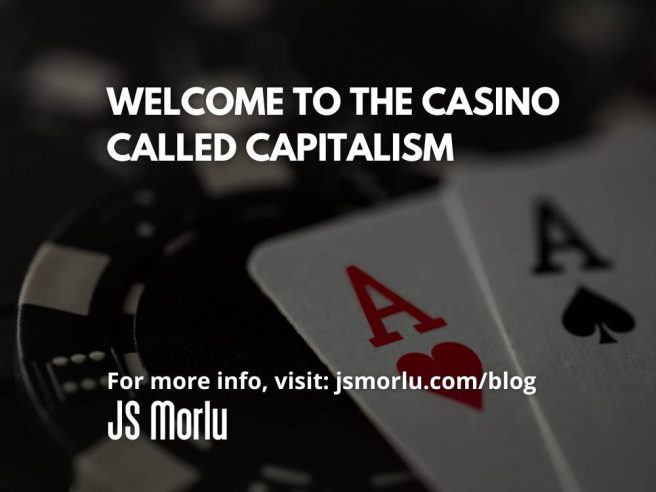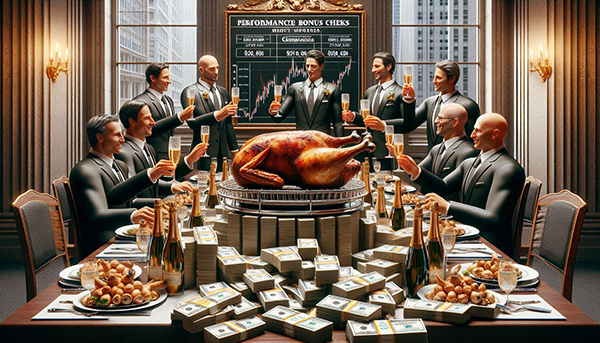By: John S. Morlu II, CPA
Picture this: You’re at a flashy Vegas casino. Over by the slot machines? That’s your 401(k). At the roulette wheel? Your student loans. But in the back—through the velvet curtain and past a bouncer named “Regulation”? That’s the high-stakes table. Welcome to the world of Leveraged Buyouts (LBOs)—where rich people buy companies with other people’s money and call it capitalism.
Want a business but don’t have the cash? No problem! Just borrow billions, buy the business using its own credit card, and make the employees pay off the loan—with their jobs.
Sound illegal? Ha. In the 1980s, this was the business model.
How to Loot a Company Without a Ski Mask
A step-by-step guide for aspiring corporate pirates
1. Find a “Lazy” Company
You’ll need a company that looks… chill. Profitable, predictable, and most importantly, sleepy. Something like “Grandpa’s Ice Cream Corp”—the kind of company where Bob from accounting has worked since Nixon was president. Bonus points if the company has:
- Lots of cash flow
- Real estate no one remembers it owns
- A fat pension fund
- A small-town CEO who says things like, “We’re a family here!”
Wall Street translation: Lunch is served.
2. Make it Rain Debt
Call up investment banks and say the magic words: “Steady cash flow.”
And just like that—BAM!—you’re swimming in money that isn’t yours. Junk bonds. Leveraged loans. Promissory notes that sound suspiciously like IOUs written on cocktail napkins.
📢 1980s Wall Street motto: “If it breathes, we can finance it.”
Legendary junk bond dealer Michael Milken practically sold debt like Girl Scout cookies. He went from “King of Wall Street” to “Federal Prisoner #00078-1989,” and then came back as a motivational speaker. (Only in America.)
3. Buy the Company… With Its Own Money
This is the part where financial logic dies and Wall Street throws a party.
You take all that borrowed cash and buy the company. But instead of paying the debt yourself, you stick it on the company’s books. It’s like using someone else’s piggy bank to buy their house—and then renting it back to them.
🏦 You: “I now own your company.”
👨🏫 Company: “How did you afford it?”
🏦 You: “You did.”
👨🏫 Company: “Wait, what—”
🏦 You: “You’re fired.”
4. Slash, Burn, Sell, Repeat
Now the fun begins!
To pay off all that juicy debt, you start “trimming the fat.” Except “fat” means:
- 5,000 employees
- The research team
- The pension fund
- And the office coffee machine
Then you start selling the company’s pieces like a garage sale hosted by Gordon Gekko:
- Division A? Sold to your cousin’s hedge fund.
- Warehouse B? Now a yoga studio.
- Brand C? Rebranded as a “tech startup” and IPO’d before anyone asked questions.
Accountants call it “unlocking value.”
Everyone else calls it: corporate cannibalism.
Real-World Recipe: Beatrice Foods Gets Beaten to a Pulp
Beatrice Foods was once a mega-conglomerate that owned everything from Tropicana to Samsonite. Then it got gobbled up in a $6.2 billion LBO.
Within three years, Beatrice was dismembered like a rotisserie chicken at a Wall Street BBQ.
Outcome?
- Investment bankers: richer than ever
- Executives: swimming in “performance bonuses”
- Employees: holding cardboard signs
- Beatrice: what Beatrice?
Why It Was Legal (and Weirdly Celebrated)
Congress saw what was happening. But instead of acting fast, they… hosted hearings and watched like it was a Netflix docuseries. The CRS report was like the one guy at the party yelling, “Hey, maybe setting the couch on fire is a bad idea!”
Wall Street, drunk on deal fees and Dom Pérignon, shouted back:
“Relax, it’s innovation!”
Fun Fact Interlude: Things That Had More Rules Than LBOs in the ’80s
- Selling hot dogs on the street
- Watching PG-13 movies without an adult
- Using the word “Super Bowl” in an ad
- Babysitting your neighbor’s cat
- Making a lemonade stand without a license
Wall Street?
“Oh you borrowed $10 billion with zero personal risk? Cool, here’s another yacht.”
Who Got the Gold?
This wasn’t just about money—it was about extreme wealth redistribution, like Robin Hood if he stole from the middle class and gave to hedge funds.
- 🪂 Executives cashed in “golden parachutes”—millions just to leave. That’s not severance. That’s a bribe to disappear quietly.
- 💰 Bankers made millions in “deal fees”—even if the deal later exploded like a fireworks stand in July.
- 📉 Shareholders saw temporary gains. Then their stock value fell harder than an over-leveraged Jenga tower.
Meanwhile, Dave in customer service got a “Sorry you’re being downsized” mug.
Economic Consequences (a.k.a. The Hangover)
The CRS sounded every alarm possible:
- Productivity? Faked or borrowed.
- Innovation? Axed like a budget line item.
- Workers? Disposed of faster than expired yogurt.
- Industries? Became zombie companies—alive only because debt wouldn’t let them die.
The national vibe?
“Why build when you can bleed it dry?”
LBOs Today: Just Rebranded as “Private Equity”
Same game. New name. Better PR.
You’ve heard of:
- Toys “R” Us?
- Payless Shoes?
- RadioShack?
All went to private equity heaven—where brands are bought, squeezed, and sent into bankruptcy wearing name tags that say “Synergy Victim.”
Moral of the Madness
The 1987 CRS report didn’t just expose financial shenanigans—it exposed a mindset that still haunts us:
- Business isn’t about building—it’s about flipping.
- Workers aren’t assets—they’re expenses.
- Value doesn’t mean value—it means “whatever we can sell on Tuesday.”
Final Thought: The Real Pot of Gold
Want to find the real pot of gold?
Don’t chase the LBO rainbow.
Chase builders.
Chase visionaries.
Chase people who care about long-term value, not short-term extraction.
Because as the report hinted:
Leveraged buyouts made some people rich.
But they left many people broke.
And they mortgaged the future—so someone else could pop champagne today.
So the next time someone says “We’re unlocking value,”
…hold onto your wallet.
…hug your pension.
…and ask if they’re carrying a crowbar.
About the Author
John is an entrepreneur, strategist, and founder of JS Morlu, LLC, a Virginia based CPA firm with multiple software ventures including www.FinovatePro.com, www.Recksoft.com and www.Fixaars.com . With operations spanning multiple countries, John is on a mission to build global infrastructure that empowers small businesses, entrepreneurs, and professionals to thrive in an increasingly competitive world. He believes in hard truths, smart execution, and the relentless pursuit of excellence. When he’s not writing or building, he’s challenging someone to a productivity contest—or inventing software that automates it.
JS Morlu LLC is a top-tier accounting firm based in Woodbridge, Virginia, with a team of highly experienced and qualified CPAs and business advisors. We are dedicated to providing comprehensive accounting, tax, and business advisory services to clients throughout the Washington, D.C. Metro Area and the surrounding regions. With over a decade of experience, we have cultivated a deep understanding of our clients’ needs and aspirations. We recognize that our clients seek more than just value-added accounting services; they seek a trusted partner who can guide them towards achieving their business goals and personal financial well-being.
Talk to us || What our clients says about us





